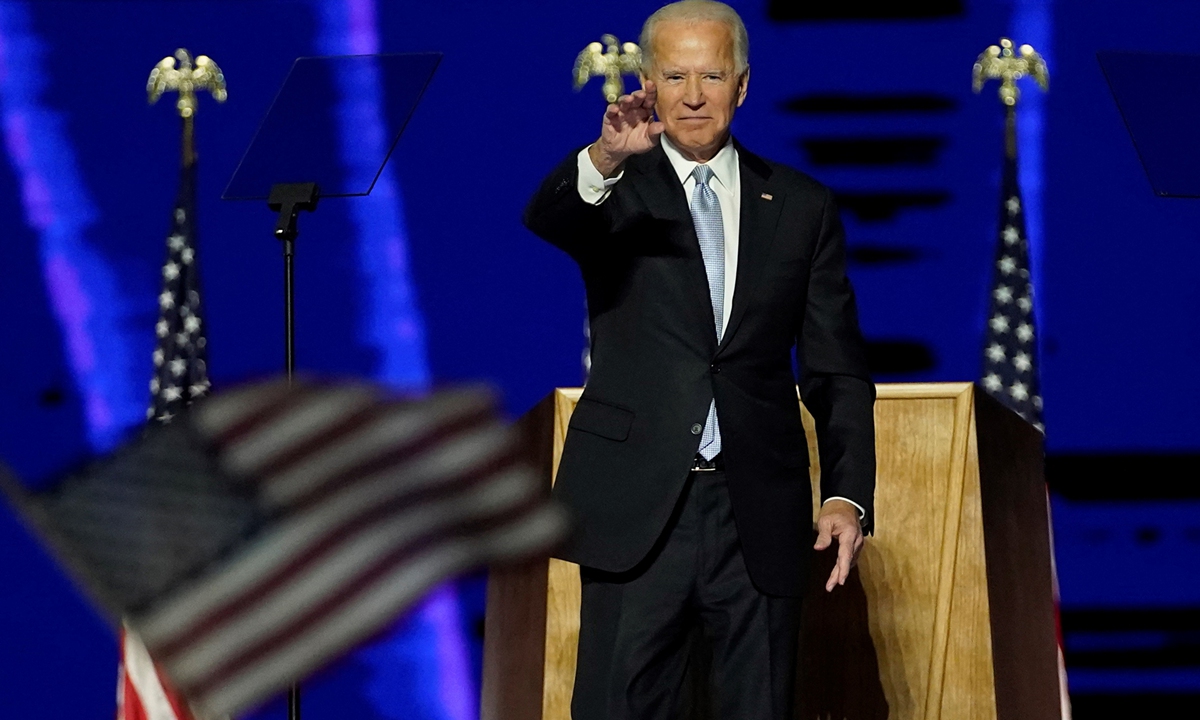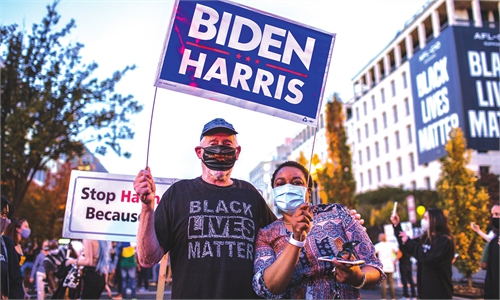
Joe Biden Photo: AFP
Questions over Joe Biden's potential China policy have raised the eyebrows of scholars from both China and the US, and one notable aspect is military.
It would be naive to believe a US administration under Biden will change the course of the one led by President Donald Trump in containing China from all spectrums - including military. As the trend continues, the direction from which China feels the pressure may be different though.
Biden has said that Russia is the biggest threat to US security, and characterized China as a competitor rather than an adversary. It is safe to say that the US has no will to have a war with China. This was even so over the course of the Trump administration. Then US Defense Secretary Mark Esper made clarifications in late October through military and diplomatic channels that the US side has no intention of creating a military crisis against China - the so-called October Surprise.
Biden is less likely to launch a military adventure than Trump. He may take into consideration the costs and consequences of a military showdown with China and exercise restraint. But still, the US will not agree to the just development of China - nor cooperate with China militarily. The Biden administration may slightly adjust its policies, but probably not steer too far away. The South China Sea is seen as a flash point between Chinese and US militaries. The US has been sending warships to the region as part of its so-called freedom of navigation operations (FONOPs). The Obama administration authorized six FONOPs and the Trump administration as high as 23. Biden will face a test in terms of FONOPs, which have become a habitual practice of the US. If Biden stops it, he would give the Republicans an excuse to accuse him of being soft on China.
Therefore, the future Biden administration is likely to continue with it, but will control the frequency and intensity and be careful about selecting the waters around the islands in order to avoid a military clash with China.
The US has been observing China's reactions. The US cares when China reacts in a hardline manner. It is making a test. The Americans adopt such a logic that its patrols will become a status quo regardless of China's objections. But China will not agree to the status quo - hence strengthens its countermeasures.
The US media have singled out Michele Flournoy as Biden's favorite pick for the top position in the Pentagon. A June article Flournoy wrote in Foreign Affairs magazine has also been raised as proof of her tough stance toward China. "If the US military had the capability to credibly threaten to sink all of China's military vessels, submarines, and merchant ships in the South China Sea within 72 hours, Chinese leaders might think twice before, say, launching a blockade or invasion of Taiwan; they would have to wonder whether it was worth putting their entire fleet at risk," she wrote.
This does not mean Flournoy is pro-war. Rather, she hinted no war with the mainland. This is the general posture of the US in dealing with the Taiwan question now. Washington's logic is that if the US sits still, the mainland will make the next move. But if the US is powerful enough, the mainland dares not to move. On the one hand, what Flournoy possibly means is an excuse for the US military deployments. But on the other hand, it shows that the US does not want a war.
Regardless of who is selected as the new defense secretary, he or she will emphasize China's challenge and US' absolute supremacy in regions such as the Asia-Pacific. Hegemony lies behind US' habitual military actions.
No matter who takes the rein in the US, China will stick to its path of peaceful development and develop its military. In recent years, the development of China's weapons has aimed at certain targets and has been practical. And such a trend will continue.
The author is deputy director of the Department for International and Strategic Studies, China Institute of International Studies. opinion@globaltimes.com.cn


